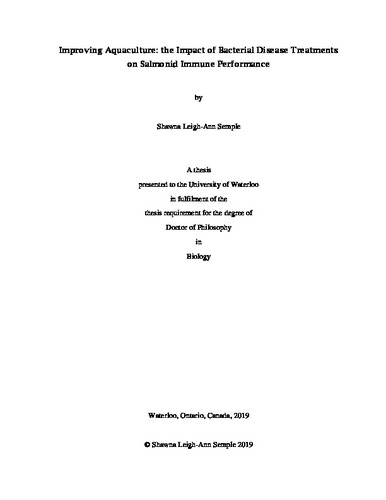| dc.description.abstract | Aquaculture is a global multibillion-dollar industry that is continuously threatened by infectious diseases, including those of bacterial origin. Currently, the only method to combat bacterial disease outbreaks as they occur is the use of antibiotics. Though effective, this method increases the prevalence of antibiotic resistant bacteria. Any prophylactic treatments available provide slightly increased protection but require improvements. To facilitate vaccine design and/or treatments, a deeper understanding of fish immunity is essential. When considering Canadian finfish aquaculture, the industry is dominated by salmonids including freshwater rainbow trout and saltwater Chinook salmon. The contents of this thesis examine bacterial diseases that are relevant to the intensive culture of these two salmonid species. More specifically, both in vitro and in vivo analyses were used to explore the immune performance of salmonids when assessing breeding strategies, bacterial pathogenesis and alternative treatment options. The freshwater rainbow trout model analyzed infection with Flavobacterium psychrophilum, the causative agent of bacterial coldwater disease (BCWD). Initially, forty families were created and assessed for resistance/susceptibility to F. psychrophilum following infection. Based on survival, the immune performance of the highest and lowest performing crosses was evaluated through serum IgM production, MHC II β1 genotype and respiratory burst activity (RBA). Despite not finding significant differences between the resistance and susceptible families, RBA of leukocytes was observed to significantly decrease when fish were presenting disease symptoms. This observation led to the use of the rainbow trout immune cell line, RTS11, as a model to learn more about the pathogenesis of the organism and to test the efficacy of a promising antimicrobial peptide (AMP) called pituitary adenylate cyclase-activating polypeptide (PACAP). The saltwater Chinook salmon model used Vibrio anguillarum, the causative agent of vibriosis, for immune studies. In this system, outbreeding was used to determine if the immune performance of an inbred aquaculture stock could be enhanced via hybrid vigor. The inbred stock was crossed with seven wild populations and, following infection with V. anguillarum, survival, serum IgM production, MH II β1 genotype and immune transcript expression were assessed. This revealed that higher performing crosses had reduced inflammatory transcript expression as well as heterozygosity of the MH II β1 gene. To explore infection at the cellular level, a stromal cell line was created and characterized from Chinook salmon spleen so that immune transcript levels to heat-killed V. anguillarum could be explored. The results obtained from this thesis were able to provide novel and functional information regarding the immune response of salmonids and the pathogenesis of industrially relevant bacteria. Additionally, a greater understanding of fish immunity in response to bacterial infection was obtained and could help enhance future disease treatments for aquaculture. A steady and increasing supply of fish protein from responsible aquaculture will reduce pressures on wild stocks, some of which are extensively exploited and in danger of collapse. | en |

